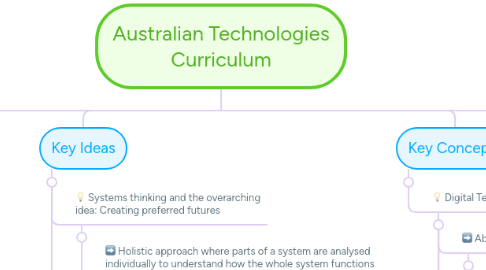
1. Curriculum Aims and Objectives
1.1. To ensure that students gain rich understandings when learning about and working with traditional, contemporary and emerging technologies.
1.2. Allow students to experience the processes through which technologies are developed and how technologies can contribute to societies.
1.3. Teach students how to develop solutions to complex scenarios and to live in a sustainable manner.
2. Achievement Standards
2.1. Indicate the learning that students should typically demonstrate at specific points in their schooling.
2.2. Sumarise the distinctive practices common to all Technologies subjects.
2.3. They further explain how the interrelated strands relate to one another.
3. Key Ideas
3.1. Systems thinking and the overarching idea: Creating preferred futures
3.1.1. Holistic approach where parts of a system are analysed individually to understand how the whole system functions (interactions and interrelationships between the parts).
3.2. Project management
3.2.1. Planning
3.2.2. Evaluating processes
3.2.3. Considering constraints
3.2.4. Risk assessment and management
3.2.5. Decision-making strategies
3.2.6. Quality control
3.2.7. Resource, finance, work and time plans
3.2.8. Collaborating/communicating with others
4. Subjects and Strands
4.1. Design and Technologies
4.1.1. Processes and Production Skills
4.1.1.1. Critiquing, exploring and investigating
4.1.1.2. Generating, developing and evaluating ideas
4.1.1.3. Planning, producing and evaluating designed solutions
4.1.2. Knowledge and Understanding
4.1.2.1. Technologies and society
4.1.2.2. Technologies and contexts
4.1.2.3. Materials and technologies specialisations
4.1.2.4. Food and fibre production
4.1.2.5. Engineering principles and systems
4.1.2.6. Food technologies
4.2. Digital Technologies
4.2.1. Processes and Production Skills
4.2.1.1. Managing and analysing data
4.2.1.2. Using digital systems
4.2.1.3. Specification, algorithms and implementation
4.2.1.4. Creating and interacting online
4.2.2. Knowledge and understanding
4.2.2.1. Representation of data
4.2.2.2. Digital systems
4.2.2.3. Interactions and impact
5. Key Concepts
5.1. Digital Technologies
5.1.1. Abstraction
5.1.1.1. Hiding details that aren’t significant to the purpose, in order to investigate a manageable number of aspects.
5.1.2. Data collection, representation and interpretation
5.1.2.1. Properties, sources and collection of data
5.1.2.2. Symbolism and separation
5.1.2.3. Patterns and contexts
5.1.3. Specification, algorithms and implementation
5.1.3.1. Focuses on the precise and elegant definition and communication of problems and their solutions.
5.1.4. Digital systems
5.1.4.1. The components: hardware, software, and networks and the internet.
5.1.5. Interactions and impact
5.1.5.1. Focus on all aspects of human interaction with and through information systems.
5.1.5.2. The positive/negative economic, environmental and social impacts facilitated by information systems.
6. General Capabilities
6.1. The knowledge and skill set that aims to support students to be successful in the twenty-first century.
6.1.1. Literacy
6.1.1.1. To interpret and use language confidently for all purposes, in and out of school, and for participating effectively in society.
6.1.2. Numeracy
6.1.2.1. To recognise and understand the importance of mathematics in the world.
6.1.3. ICT Capability
6.1.3.1. Adapt to new ways of doing things as technologies evolve.
6.1.4. Critical and Creative Thinking
6.1.4.1. Learn to create and evaluate knowledge, clarify concepts and ideas, seek possibilities, consider alternatives and solve problems.
6.1.5. Personal and Social Capability
6.1.5.1. Students learn to understand themselves and others, and manage their relationships, lives, work and learning more effectively.
6.1.6. Ethical Understanding
6.1.6.1. Identify and investigate the nature of concepts, values, character traits and principles, and understand how reasoning can assist ethical judgment.
6.1.7. Intercultural Understanding
6.1.7.1. Students learn to value their own cultures, languages and beliefs, and those of others.
7. Student Diversity
7.1. Curriculum has to be adapted to suit the diverse needs of all students and needs to be personalised for their learning.
7.1.1. Students with disability
7.1.2. English as an additional language or dialect
7.1.3. Gifted and talented students
8. Cross-Curriculum Priorities
8.1. Topics embedded in all learning areas.
8.1.1. Aboriginal and Torres Strait Islander histories and cultures
8.1.1.1. Provide opportunities for students to actively engage in learning about how the world's oldest culture contributed to past, present and future technologies.
8.1.2. Asia and Australia’s engagement with Asia
8.1.2.1. Provide diverse and authentic contexts to develop knowledge and understanding of technologies processes and production and related cultural, social and ethical issues.
8.1.3. Sustainability
8.1.3.1. Provide meaningful circumstances in order for students to experiment with creating preferred futures.
